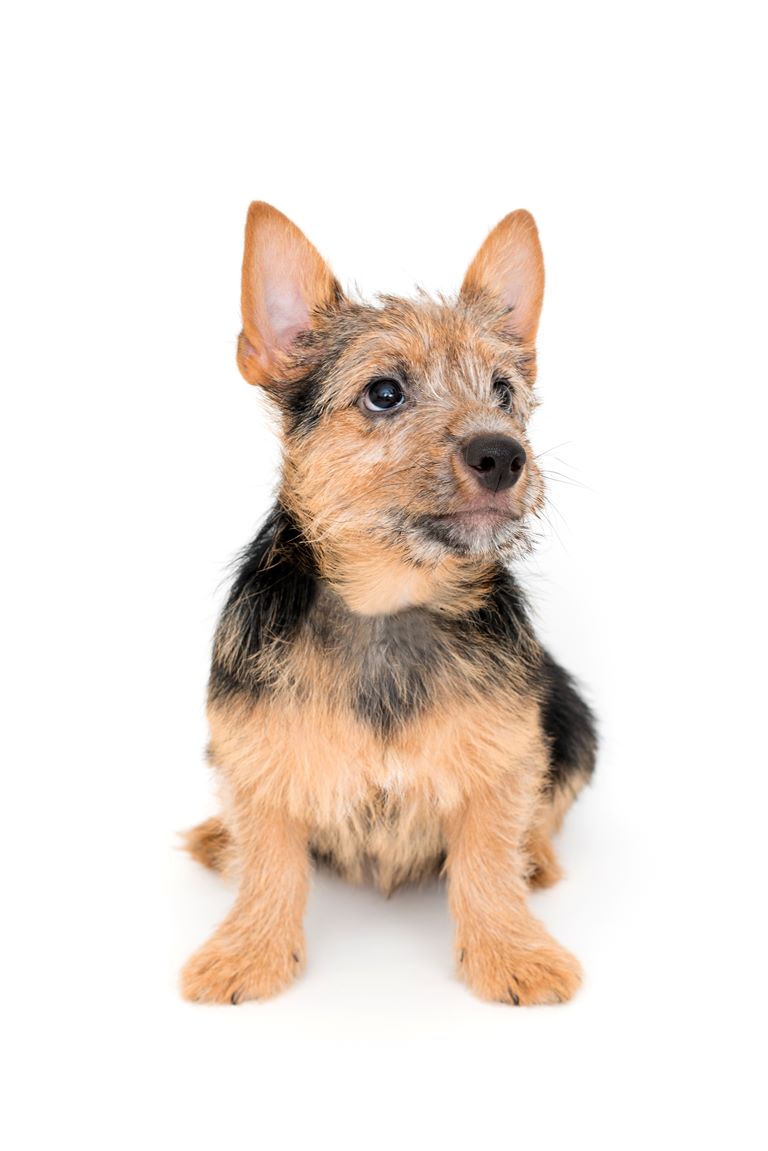Are you considering getting a new furry friend and wondering which breed to choose? Have you considered a Norwich Terrier? These little dogs are known for their spunky personalities and loyalty to their owners. Originally bred in England for hunting small rodents, Norwich Terriers have become popular as family pets due to their compact size and affectionate nature. They are highly adaptable to various living situations, making them a great choice for both city and country living. In this article, we will explore the characteristics of the Norwich Terrier breed and help you determine if this is the perfect breed for you.
Breed Category: Terrier
Country of Origin: United Kingdom
Average Size:25-26 cm
Average Weight:5-6 kg
Average Life Span: 12-15 years
Grooming Requirements: Moderate
Exercise Requirements:Moderate
History and Origin
The Norwich Terrier is a small breed of dog that originated in the East Anglia region of England. The breed was developed in the late 19th century by crossing various small terrier breeds, including the Irish Terrier and the Border Terrier. The Norwich Terrier was originally bred for hunting small game, such as rats and rabbits, and was also used as a watchdog.
The Norwich Terrier was first recognized as a breed in 1932 by the Kennel Club in the United Kingdom. The breed was named after the city of Norwich, which is located in the East Anglia region of England. The Norwich Terrier quickly became popular in the UK and was exported to other countries, including the United States.
In the United States, the Norwich Terrier was recognized as a breed in 1936 by the American Kennel Club. The breed quickly gained popularity in the US and was used for hunting, as well as for companionship. The Norwich Terrier is now recognized by many other kennel clubs around the world, including the Canadian Kennel Club and the Australian National Kennel Council.
The Norwich Terrier is a small, sturdy dog that typically weighs between 10 and 12 pounds. The breed has a wiry, weather-resistant coat that can be red, wheaten, black and tan, or grizzle. The Norwich Terrier is known for its friendly and outgoing personality, as well as its intelligence and loyalty. The breed is also known for its high energy level and love of exercise.
The Norwich Terrier has been used for a variety of purposes throughout its history. In addition to hunting and watchdog duties, the breed has also been used for ratting and as a circus performer. The Norwich Terrier has also been used in the development of other breeds, including the Norfolk Terrier and the Australian Terrier.
Today, the Norwich Terrier is primarily kept as a companion animal. The breed is known for its affectionate and playful nature, as well as its adaptability to different living situations. The Norwich Terrier is a popular choice for families with children, as well as for individuals and couples who are looking for a small, active dog.
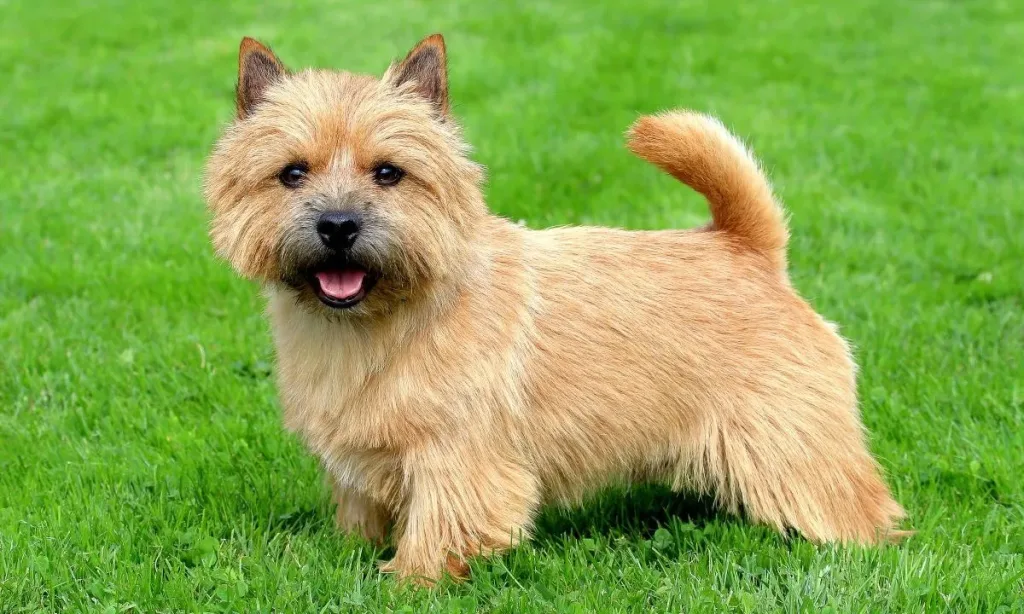
Size and Breed Category
The Norwich Terrier is a small breed of dog that is known for its lively and energetic personality. They are typically between 25-28 cm in height and weigh around 5-6 kg. Despite their small size, they are muscular and sturdy, with a compact body and short legs. Their coat is wiry and comes in a range of colours, including red, black and tan, and wheaten. They have a distinctive expression, with their pointed ears and bright, alert eyes. Norwich Terriers are classified as a terrier breed, which means they were originally bred for hunting small game such as rats and foxes. They are known for their tenacity and courage, and are often described as being feisty and independent.
The Norwich Terrier is a member of the toy group, which means they are one of the smallest breeds of dog. They are often compared to their close relative, the Norfolk Terrier, which has similar physical characteristics but has folded ears instead of pointed ones. Despite their small size, Norwich Terriers are known for their big personalities and are often described as being confident and outgoing. They are loyal and affectionate towards their owners, but can be wary of strangers. They are also highly intelligent and respond well to training, although they can be stubborn at times. Overall, the Norwich Terrier is a charming and lively breed that makes a great companion for those who are looking for a small but spirited dog.
Fur Length and Colour
The fur of a Norwich Terrier is typically short and wiry, with a dense undercoat that provides insulation in colder weather. The fur is also water-resistant, which makes it ideal for outdoor activities. The fur on the head and ears is usually shorter and softer than the rest of the body, and the fur on the legs is longer and slightly feathered. The fur colour can vary, but the most common colours are red, wheaten, black and tan, and grizzle. The red and wheaten colours can range from pale cream to deep red, while the black and tan colouration is usually a jet black with tan markings on the face, chest, and legs. The grizzle colouration is a mix of black and grey hairs, giving the fur a salt-and-pepper appearance.
The Norwich Terrier’s fur requires regular grooming to maintain its texture and appearance. Brushing the fur once or twice a week will help to remove any loose hairs and prevent matting. Bathing should be done only when necessary, as frequent bathing can strip the fur of its natural oils. The fur around the ears and eyes should be trimmed regularly to prevent irritation and infection. The Norwich Terrier’s fur is an important part of its appearance and personality, and proper care will ensure that it remains healthy and beautiful.
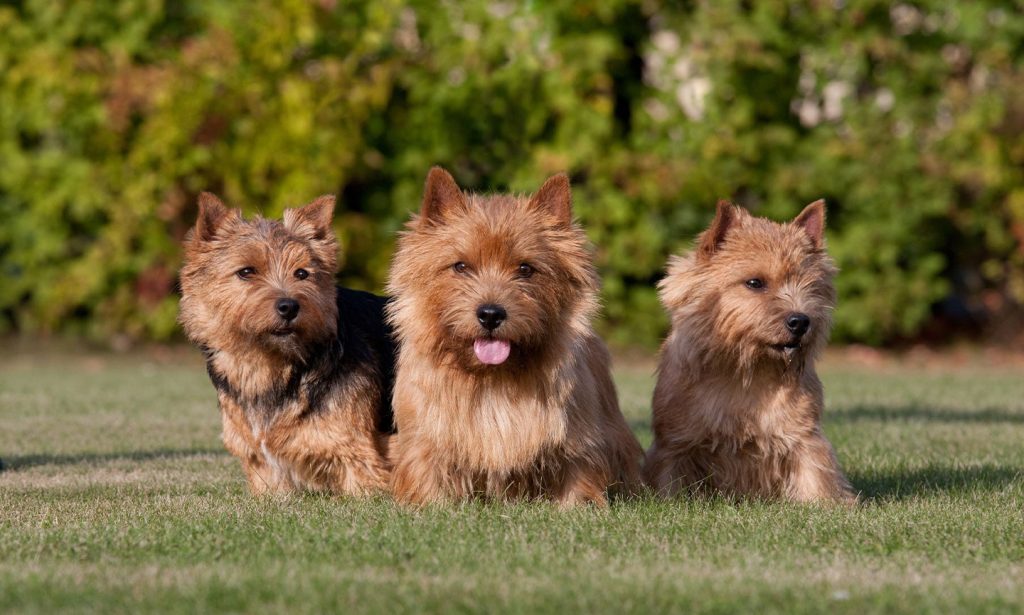
Termperament and Trainability
Norwich Terriers are known for their lively and affectionate temperament. They are highly energetic and love to play, making them great companions for active families. They are also very loyal and protective of their owners, which can make them excellent watchdogs. However, their strong-willed nature can sometimes make them difficult to train, especially if they are not properly socialized from a young age. It is important to establish clear boundaries and consistent training methods to ensure that they do not become too stubborn or aggressive. With patience and persistence, however, Norwich Terriers can be trained to perform a variety of tasks, including obedience, agility, and even therapy work.
In terms of trainability, Norwich Terriers are generally considered to be intelligent and quick learners. They are eager to please their owners and respond well to positive reinforcement techniques, such as treats and praise. However, they can also be quite independent and may require a firm hand when it comes to training. It is important to establish yourself as the pack leader early on and to be consistent in your training methods. Norwich Terriers can be sensitive to harsh discipline, so it is important to use gentle but firm correction when necessary. With the right approach, Norwich Terriers can be trained to be well-behaved and obedient companions.
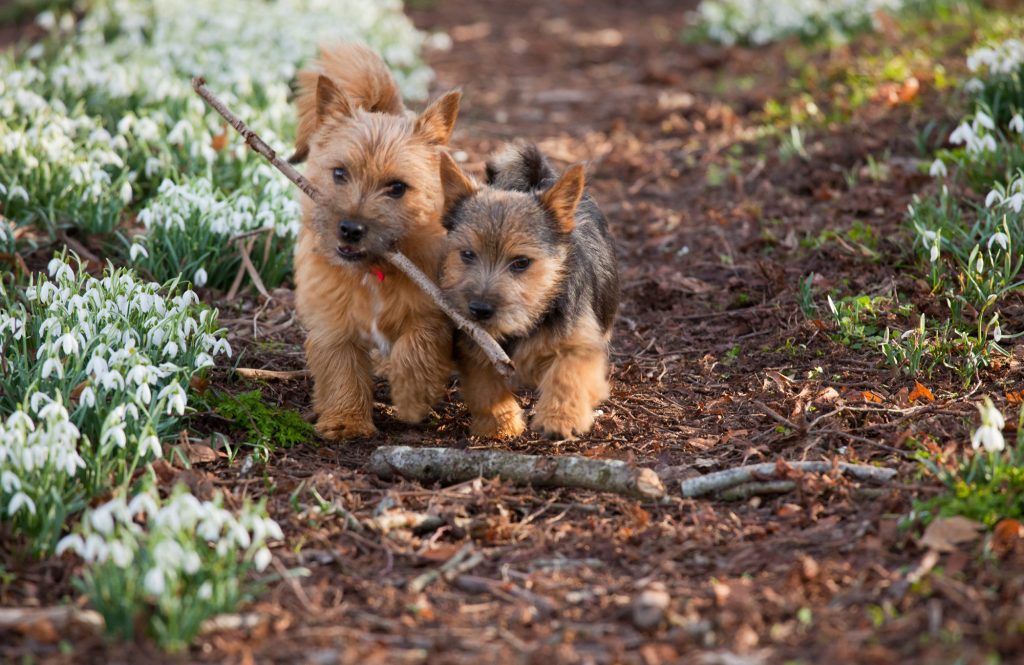
Known Health Conditions
Norwich Terriers are prone to certain health conditions that owners should be aware of. One of the most common issues is hip dysplasia, which is a genetic condition that affects the hip joint. This can cause pain, lameness, and arthritis in the affected joint. Another condition that Norwich Terriers are susceptible to is patellar luxation, which is when the kneecap dislocates from its normal position. This can cause pain and difficulty walking, and in severe cases, surgery may be required to correct the problem. Additionally, Norwich Terriers may develop allergies, which can cause skin irritation, itching, and hair loss. It is important for owners to monitor their dog’s skin and seek veterinary care if they notice any signs of allergies.
Another health condition that Norwich Terriers may experience is dental problems. Due to their small size, their teeth can become crowded, leading to tartar buildup and gum disease. Regular dental cleanings and at-home dental care can help prevent these issues. Additionally, Norwich Terriers may be prone to eye problems such as cataracts and glaucoma. These conditions can cause vision loss and may require surgery to correct. Finally, Norwich Terriers may develop epilepsy, which is a neurological disorder that causes seizures. This condition can be managed with medication, but it is important for owners to work closely with their veterinarian to ensure their dog’s seizures are under control.
Openness to Strangers
Norwich Terriers have a reputation for being friendly and sociable with strangers. They are known to be outgoing and curious, often approaching new people with enthusiasm. This breed is not typically shy or reserved, and they tend to enjoy meeting new people and making new friends. Norwich Terriers are also known for their loyalty and affection towards their owners, but they are not typically possessive or territorial. They are generally happy to share their affection with anyone who is willing to give them attention.
Despite their small size, Norwich Terriers are not typically timid or fearful around strangers. They are known for their confidence and boldness, and they are not easily intimidated. This breed is often described as being spunky and spirited, with a lively and energetic personality. Norwich Terriers are also known for their intelligence and trainability, which makes them well-suited for a variety of activities and tasks. Overall, this breed is known for their friendly and outgoing nature, which makes them a popular choice for families and individuals who are looking for a companionable and sociable pet.
Playfulness Level
The Norwich Terrier is a highly energetic and playful breed of dog. They are known for their lively and mischievous nature, which makes them a popular choice for families with children. These dogs love to play and are always up for a game of fetch or tug-of-war. They have a lot of energy to burn and require plenty of exercise to keep them happy and healthy.
The Playfulness Level of the Norwich Terrier is one of their most endearing qualities. They are always eager to play and have a great sense of humor. These dogs are known for their silly antics and love to make their owners laugh. They are also very affectionate and enjoy spending time with their families. If you are looking for a fun-loving and playful companion, the Norwich Terrier is an excellent choice.
Suitability as a Pet for Children
Norwich Terriers have a friendly and affectionate nature, making them a great choice as a pet for children. They are energetic and playful, which means they will enjoy spending time with kids and participating in activities such as playing fetch or going for walks. Additionally, Norwich Terriers are intelligent and easy to train, which can make them a good fit for families with young children who are learning how to care for a pet. Their small size also means they can adapt well to living in smaller homes or apartments.
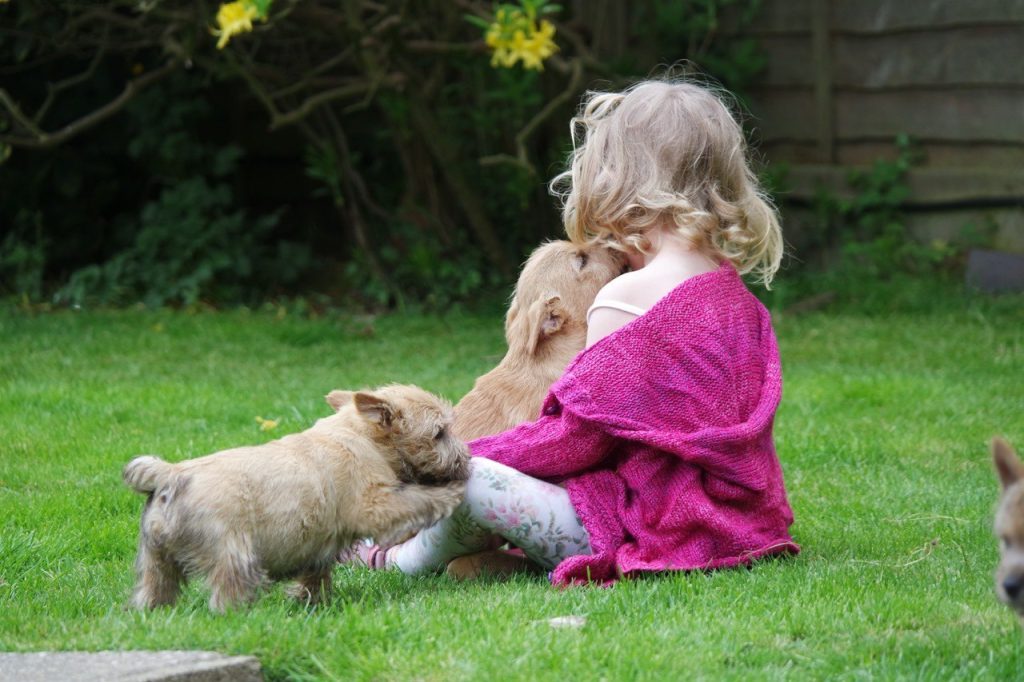
Exercise Needs
Norwich Terriers require a moderate amount of exercise to maintain their physical and mental health. They are an active breed that enjoys daily walks and playtime in a secure, fenced yard. A minimum of 30 minutes of exercise per day is recommended, but they will happily engage in more vigorous activities such as running, hiking, and agility training. It is important to note that Norwich Terriers have a high prey drive and should always be kept on a leash or in a secure area to prevent them from chasing after small animals. Additionally, they are prone to weight gain, so regular exercise and a balanced diet are essential for their overall well-being.
In addition to physical exercise, Norwich Terriers also require mental stimulation to prevent boredom and destructive behavior. They are intelligent dogs that enjoy learning new tricks and participating in obedience training. Puzzle toys and interactive games can also provide mental stimulation and keep them entertained. It is important to provide a variety of activities to prevent them from becoming bored with their routine. Norwich Terriers thrive on human interaction and enjoy spending time with their owners, so incorporating exercise and playtime into daily routines can strengthen the bond between the dog and their family.
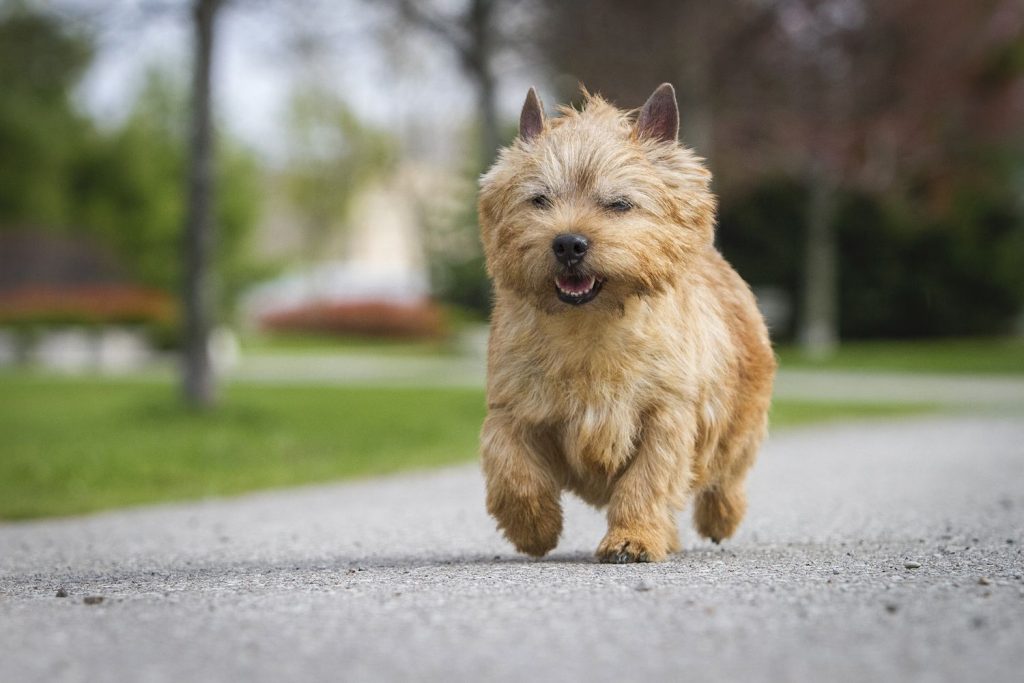
Suitability for a Multi-Pet Family
Norwich Terriers have a reputation for being friendly towards other pets. They are known to get along well with cats and other dogs, as long as they are socialized properly from a young age. However, it is important to note that every dog is different and some Norwich Terriers may not be as accepting of other animals. It is always best to introduce new pets slowly and under supervision to ensure a positive outcome.
Housing Requirements
Norwich Terriers require a living space that is suitable for their size and energy levels. They are active dogs that require daily exercise, so a house with a garden or access to a park is ideal. The garden should be securely fenced to prevent the dog from escaping, as Norwich Terriers have a tendency to chase after small animals. The house itself should have enough space for the dog to move around comfortably, but they do not require a large living space. A small to medium-sized house or apartment is suitable for a Norwich Terrier, as long as they have access to outdoor exercise.
In terms of sleeping arrangements, Norwich Terriers prefer a warm and comfortable bed. They are small dogs, so a small dog bed or crate is sufficient. The bed should be placed in a quiet area of the house, away from any noise or distractions. Norwich Terriers are social dogs and enjoy being around their owners, so it is recommended that their bed is placed in a room where the family spends most of their time. Additionally, Norwich Terriers require regular grooming, so a designated grooming area with a table and grooming tools is also recommended.
Summary
Norwich Terriers make great pets for those who are looking for a loyal and affectionate companion. They are known for their playful and energetic personalities, making them a great choice for families with children or active individuals. They are also intelligent and easy to train, making them a good fit for first-time dog owners. Additionally, their small size makes them suitable for apartment living. Overall, Norwich Terriers are a great choice for those looking for a loving and lively pet.
Norwich Terrier Dog FAQS
Norwich Terriers are intelligent and eager to please, but can be stubborn. Consistent and positive training methods are recommended.
Yes, Norwich Terriers are generally good with children, but supervision is always recommended.
Yes, Norwich Terriers can adapt well to apartment living as long as they get enough exercise and mental stimulation.
Norwich Terriers can be prone to certain health issues such as hip dysplasia, allergies, and eye problems. Regular vet check-ups are important.
No, Norwich Terriers have a wiry coat that sheds minimally. Regular grooming is still necessary.
Norwich Terriers have a lifespan of 12-15 years on average.
Norwich Terriers need at least 30 minutes of exercise per day, such as a brisk walk or playtime in the yard.
Norwich Terriers should be groomed at least once a week to maintain their wiry coat and prevent matting.
Norwich Terriers usually grow up to 25 cm in height.
The average weight of a Norwich Terrier is between 5-6 kg.
